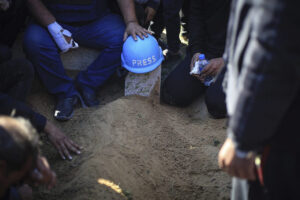Israel’s long-subservient media has spent the past year imbuing the public with a sense of righteousness over the Gaza war. Reversing this indoctrination, says media observer Oren Persico, could take decades.

A press helmet is placed over the grave of Hamza Dahdouh, a Palestinian journalist who worked for Al Jazeera and the son of Al Jazeera’s Gaza bureau chief Wael Dahdouh, who was killed in an Israeli drone strike on Rafah, January 7, 2024.
Edo Konrad writes in +972 October 16, 2024
Halfway into our conversation, Oren Persico makes a startling confession. The veteran Israeli journalist, whose job for the better half of the last two decades has been to monitor his country’s media, doesn’t watch mainstream Israeli news.
“I just can’t do it,” Persico, who has worked as a staff writer for the Israeli media watchdog site The Seventh Eye since 2006, tells me. “It’s depressing and infuriating — it’s propaganda, it’s full of lies. Mostly, it’s a mirror image of the society I live in, and it’s hard for me to break the dissonance between my worldview and my surroundings. I need to maintain my sanity.” Instead of watching, Persico stays abreast by scrolling through news sites, social media, and watching select clips that people send his way.
But even turning off the TV cannot stop the dissonance and despair Persico feels, which have only grown since the Hamas-led massacres on October 7 and the Israeli army’s ensuing year-long onslaught on the Gaza Strip. When the war began, the Israeli media found itself at a critical juncture, navigating the trauma of a nation that was shaken by unprecedented violence and quickly retreated into a deeply-entrenched perception of historical victimhood. News broadcasters responded to this national trauma, Persico notes, by slipping further into the clutches of state-sanctioned propaganda.

Oren Persico. (Courtesy)
As days of brutal violence turned into weeks and months, the Israeli media reverted to familiar patterns: rallying around the flag, amplifying state narratives, and marginalizing any critical coverage of Israel’s brutality in Gaza, let alone showing images or telling stories of human suffering among Palestinians in the Strip.
The path to this moment was paved long ago. Israel’s media landscape, which Persico says has always been subservient to the political and military establishment, has come under relentless pressure from Benjamin Netanyahu over the last decade; the Israeli prime minister has attempted to transform it into a tool for wielding power and ultimately ensuring his own political survival. Commercial media outlets, more interested in maintaining viewers than challenging power, have fallen prey to Netanyahu’s strategy of coercion, self-censorship, and economic pressure.
Recent years have also seen the rapid rise of Now 14 (widely known as Channel 14), Israel’s version of Fox News that has openly aligned itself with Netanyahu, and is now challenging the long-held dominance of Channel 12. It offers viewers not just news, but anti-Palestinian polemics — which are often outwardly genocidal — cooked up as entertainment. Netanyahu’s adept use of propaganda outlets like Channel 14, as well as social media, has helped him mold a devoted following that defends and bolsters him against domestic and international pressure.
In an interview with +972, which has been shortened and edited for clarity, Persico reflects on the media’s historical role in the denial of Israel’s human rights violations, its failure to challenge the political establishment, and the near-complete lack of solidarity for Palestinian journalists under bombardment in Gaza.
More …


